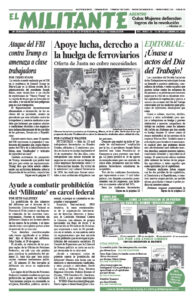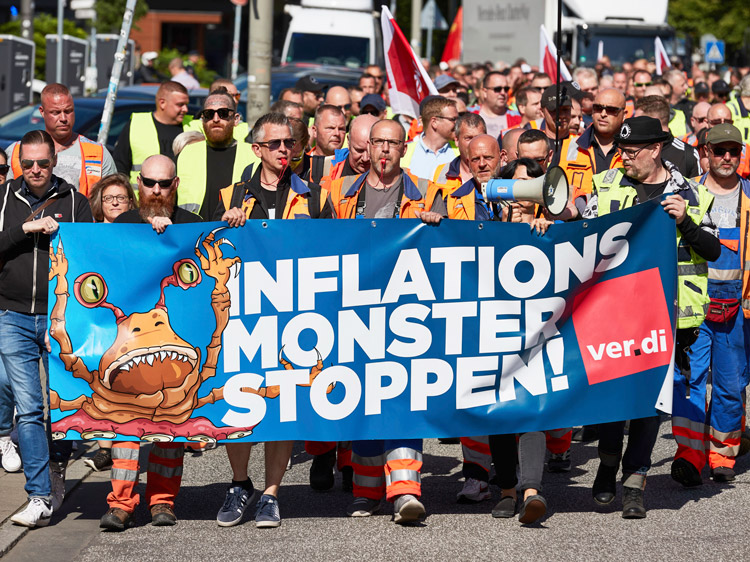The capitalist economic crisis unfolding today — rising prices combined with a downturn in manufacturing production — is heightening conflicts among rival powers that comprise the European Union and sharpening the strains tearing at the bloc of 27 governments.
The EU was established out of the carnage of the Second World War in hopes of rivaling Washington, which emerged as the world’s dominant imperialist power. But prospects for forming a common European superstate were always a pipe dream given the intractable conflicts among the continent’s ruling capitalist classes, which have sharply divergent interests in their competition for markets, resources and profits.
The establishment of the euro as a common currency — today used by 19 EU members — strengthened the ability of the rulers of Germany and France to use their superior economic and political clout to squeeze rivals, as well as the working classes in eastern and southern European nations where there is a lower level of industrial and economic development.
Annual inflation hit a record 9.1% in August within the eurozone, the highest since records began. But inflation varied widely among EU countries, up 25.2% in Estonia, 11.3% in Greece and 8.8% in Germany. This only tells part of the story about its impact on workers’ lives. Throughout the eurozone essentials like energy prices surged 38.3% in August. Food, alcohol and tobacco rose 10.6%.
For the first time since 2011, the European Central Bank raised interest rates July 21 in an attempt to rein in inflation. This makes it more difficult for the more indebted capitalist powers in southern Europe, such as Italy, Greece and Spain, to repay their loans.
Leading European Central Bank officials are calling for greater “sacrifices,” which governments and the bosses will impose on working people through job cuts as production slows.
Each EU member state can accumulate ballooning amounts of debt. But none of the capitalist rulers of these countries have the option of buffering economic crises by devaluing their currencies as they try to fuel exports and production, since only the European Central Bank can print money.
Being saddled with the debts of their weaker rivals conflicts with the drive of the dominant powers in the EU — Berlin and to a lesser degree Paris — to maximize profits off workers’ backs.
Manufacturing production across the eurozone is falling with the biggest increase in inventories of unsold products from factories in over 25 years.
Some of the sharpest drops are concentrated in Germany, Europe’s largest and most powerful capitalist economy. The country’s biggest oil refinery has cut production at its Rhineland facility, and BASF, the country’s largest chemical producer, is discussing similar steps.
The Handelsblatt, Germany’s leading financial paper, says recession is not a matter of “if” but “for how long.” Left unsaid is the impact this will have on working people who will face massive job losses at the same time that price rises escalate.
Some 12,000 dockworkers at three ports across Germany’s northern seaboard struck for 48 hours in July, their longest strike in 40 years. With goods from Europe’s biggest exporting nation tied up, bosses got compliant courts to ban further strikes until Aug. 26. Last week the union announced a deal, giving container workers a 9.4% increase this year, with a pay raise linked to inflation for 2023. If inflation is above 5.5% next year, the agreement says, the union has the right to rip up the contract so it can fight for more.
Rising energy prices
The crisis facing EU countries’ ruling families is deepened by Moscow’s invasion of Ukraine and rising prices of oil and natural gas. But Germany’s capitalist rulers have been especially hard hit. They’re planning to close all of their nuclear power plants, becoming dependent on natural gas from Moscow. The Nord Stream pipeline from Russia is currently delivering just 20% of its capacity. German officials are already discussing rationing gas supplies this winter.
During a sweltering summer heat wave, the Spanish government banned anyone from setting air-conditioning units below 80 degrees Fahrenheit in an attempt to save energy. In Portugal and Italy, privately operated textile mills are cutting back production, reported the Wall Street Journal.
The euro hit a 20-year low against the dollar Aug. 23, dropping to 98 cents. While Washington has been the EU’s largest trading partner, this drop makes imports by EU countries from the U.S. more expensive. Last year the EU imported $271.4 billion of goods from the U.S.
Conflict over Italy’s unpayable debt
The huge unpayable debts facing the rulers of Italy are at the center of tensions between EU’s rival powers. Italy’s total government debt is now up to $2.52 trillion, 150% of the country’s gross domestic product. It’s larger than combined government debts of Greece, Portugal, Ireland and Spain, all of which were given loans by the European Central Bank following the 2008 financial crash on the condition they threw workers out of their jobs and slashed social services.
The political crisis facing Italy’s rulers was highlighted by the July 21 resignation of Prime Minister Mario Draghi and the likelihood that a coalition of conservative parties more hostile to the EU will win elections set for Sept. 25.
These pressures are deepening the centrifugal forces inevitably pulling the EU apart. And they lead the capitalist rulers of each European power to deepen attacks on the working class.


